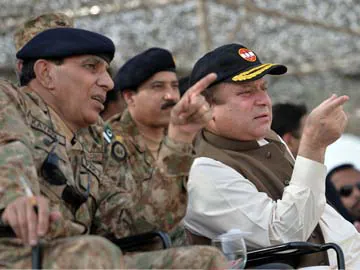In the hadith of Prophet Muhammad (peace be upon him), he mentions five eras that define Muslim history. Each era has its unique characteristics and significance, from the time of the Prophet himself to the era of monarchies and dictatorships. However, the current era of dictatorship or oppressive rule goes against the fundamental principles of Islam, which prioritize justice, fairness, and equality. In Pakistan, the military generals’ hold on power and control contradicts the very foundation on which the country was established in the name of Islam. This opinion article will explore the implications of such a deviation from Islamic principles and the need for a return to the values of the early Muslim eras.
In the era of democracy, there is no room for dictatorship, as democracy represents our covenant. Sadly, however, Pakistan has a long history of military coups, spanning over 64 years. General Ayub, for instance, seized power in 1958 and openly declared his aversion to both Islamic authority and democratic values. He saw dictatorship as essential, prioritizing political stability over democracy. However, when he was removed from power ten years later, the country was left even more politically unstable. Despite Pakistan’s foundation on Islamic principles, General Ayub was a staunch supporter of secularism, going so far as to introduce laws incompatible with the Quran and Sunnah.
The era of General Ayub in Pakistan was marked by egregious acts of character assassination and authoritarianism. In particular, Fatima Jinnah, the sister and mother of the founder of Pakistan, was subjected to half-page advertisements in newspapers accusing her of being an Indian agent. Under Ayub’s rule, criticism was silenced, and any attempt to speak out against the government was met with force. Moreover, despite East Pakistan making up 56% of the country’s population, not a single Bengali was present in the army from 1958 to 1962. General Ayub was a known Bengali hater, even harassing national heroes such as MM Alam, who shot down four Indian planes in just two minutes. When Ayub expressed a desire to meet MM Alam, he was taken aback by Ayub’s attitude towards Bengalis.
In the turbulent history of Pakistan, General Yahya Khan’s regime is often regarded as one of the most notorious. His absolute power was matched only by his fondness for wine and women, which ultimately led to the downfall of the country. However, his authoritarian rule was not limited to his personal vices. In fact, he used his power to manipulate political parties and leaders to suit his agenda. One such instance was his attempt to use Maulana Bhashani against Sheikh Mujib to win the elections. Although the plan failed, it reflects the extent of his manipulations. Moreover, despite the Hamoodur Rahman Commission’s recommendation for a court martial against him for breaking up the country, no action was taken against him. It is even rumoured that America had asked Pakistan not to take any action against Yahya Khan.
The behavior of military generals in Pakistan has been a topic of concern for many years. One such example is the statement made by General Niazi during the 1971 crisis, where he expressed his intention to rape Bengali women on a large scale. This was not only shameful but also goes against the principles of Islam. Despite this, no disciplinary action was taken against General Niazi for his statement. Another example is General Ayub Khan, who was once hailed as a hero of America but was removed from his post for objecting to orders to halt advances against Japan during the Second World War. It is clear that the military establishment has not held its generals accountable for their actions, even when they are in direct violation of human rights and international law.
The history of Pakistan is marred by controversial events that have shaped the nation’s political landscape. One such event is the judicial murder of former Prime Minister Zulfikar Ali Bhutto, which has remained a subject of debate and controversy to this day. The hanging of Bhutto was the result of a trial that many believe was politically motivated and lacked due process. The circumstances leading up to Bhutto’s execution were further complicated by the preceding era of General Zia-ul-Haq, who is alleged to have orchestrated a bloody coup that paved the way for Bhutto’s downfall. Despite his controversial past and alleged fascist tendencies, Bhutto’s execution turned him into a hero of the nation and laid the groundwork for his party’s continued political dominance.
In the world of politics, leaders are often praised for their successes but criticized for their failures. General Pervez Musharraf, a war hero in the Kargil War, is no exception to this rule. Despite his initial popularity, the nation later saw him begging for talks with India, ultimately deviating from the fundamental solution of the Kashmir issue during negotiations. Musharraf’s controversial statements, including his alleged insult of Kashmiri leader Syed Ali Gilani, have also been the subject of debate. Additionally, his decision to hand over entire Pakistan to America after 9/11 has been widely criticized.
In a recent column, Hamid Mir has shed light on some surprising developments in the leadership of General Bajwa, including his alleged involvement in secret talks between Pakistani intelligence and Indian officials. According to Mir, General Bajwa even went so far as to suggest that Indian Prime Minister Narendra Modi would visit Pakistan and participate in the annual Hindu fair at a temple in Balochistan. However, the proposal raised questions about the ongoing Kashmir issue. Mir’s column provides a glimpse into the complex power dynamics at play in Pakistani politics and the delicate balance between regional peace and national interests.
In recent years, the issue of Kashmir has been a major point of contention between India and Pakistan. The ongoing conflict has had a significant impact on the politics of both countries, including the leadership of Pakistan’s military. In a recent column, journalist Hamid Mir sheds light on the actions of General Bajwa and his approach to resolving the Kashmir issue. Mir highlights the tensions between Bajwa and Shah Mahmood Qureshi, Pakistan’s Foreign Minister, and how Bajwa’s actions may have affected the political landscape of Azad Kashmir. Additionally, Mir delves into the longstanding issue of Kashmir, which has been a source of tension between India and Pakistan for over two decades.
Dear TNT Reader,
At The News Tribe, our mission is to bring you free, independent, and unbiased news and content that keeps you informed and empowered. We are committed to upholding the highest standards of journalism, as we understand that we are a platform for truth.
Apart from independent global news coverage, we also commit our unique focus on the Muslim world. In an age marked by the troubling rise of Islamophobia and widespread misrepresentation of Muslims in Western media, we strive to provide accurate and fair coverage.
But to continue doing so, we need your support. Even a small donation of 1$ can make a big difference. Your contribution will help us maintain the quality of our news and counteract the negative narratives that are so prevalent.
Please consider donating today to ensure we can keep delivering the news that matters. Together, we can make a positive impact on the world, and work towards a more inclusive, informed global society.
Donate Monthly Subscription Annual Subscription





